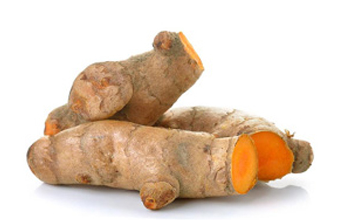Turmeric is one of the most effective natural nutritional supplements. The results of many mainstream studies have confirmed its benefits for the body and brain. Here are 10 science-backed turmeric health benefits.
1. Turmeric contains bioactive compounds with powerful medicinal values
Turmeric is the spice that gives curry food its yellow color. It has been used in India for thousands of years for culinary and medicinal purposes. Recent research has found that the herb's rhizome does contain compounds with health benefits. These are called curcuminoids, with curcumin being the most important.
Curcumin, the main active ingredient in turmeric, has anti-inflammatory properties and is a powerful antioxidant. However, the curcumin component of turmeric is a modest 3% or so by weight. Most studies based on this herb use turmeric extracts (which contain the most curcumin) and usually employ a dosage of 1 gram per day. However, it is difficult to achieve this level of turmeric spice dosage in food. Therefore, extracts containing sufficient amounts of curcumin should be taken if therapeutic effects are desired.
It should be noted that curcumin is difficult to be absorbed into the bloodstream. However, consumption with black pepper, a natural substance that increases the absorption of curcumin by 2,000 times, aids in absorption. Additionally, curcumin is fat-soluble, making it more effective when consumed with high-fat foods.
2, Curcumin is a natural anti-inflammatory compound
Inflammation is a very important body function. It helps defend against foreign invaders and plays a role in repairing damage. Without inflammation, pathogens such as bacteria can easily take control of the body and kill us. While acute inflammation is beneficial, chronic can become problematic and can inappropriately resist the body's own tissues.
In fact, many chronic diseases are associated with prolonged low levels of inflammation, such as heart disease, cancer, metabolic syndrome, Alzheimer's and various degenerative diseases. Therefore, anything that can help ward off chronic inflammation is good for preventing, and even treating, these diseases. Since curcumin has excellent anti-inflammatory properties, it is as effective as some anti-inflammatory medications.
3, turmeric significantly improve the body's antioxidant capacity
Oxidative damage is considered as one of the causes of aging and many diseases. It involves free radicals, which are highly reactive molecules with unpaired electrons. Free radicals have a tendency to react with vital organ substances such as fatty acids, proteins or DNA. The reason why antioxidants are beneficial is that it protects the body from free radical damage. Curcumin happens to be a powerful antioxidant that counteracts free radical damage. In addition, curcumin promotes the activity of the body's own antioxidant enzymes.
4、Curcumin improves brain-derived neurotrophic factor
Curcumin improves brain function and reduces the risk of brain disease. It used to be thought that neurons could not divide and proliferate after young children. However, it is now known to happen. Neurons have the ability to form new connections, but in specific areas of the brain, and can proliferate and increase in number. One of the main drivers of this process is Brain-Derived Neurotrophic Factor (BDNF): a growth hormone for brain function. Many common brain disorders have been linked to a decrease in this hormone, such as depression and Alzheimer's disease.
Interestingly, curcumin increases the brain's levels of Brain-Derived Neurotrophic Factor. This is effective in slowing down, and even reversing, some brain disorders, as well as aging disorders associated with reduced brain function. In addition, this promotes memory and makes people smarter.
5, Curcumin reduces the risk of heart disease
Heart disease is one of the biggest risk factors for death. Curcumin can help reverse the process of heart disease. The main benefit of turmeric for the heart is the promotion of endothelial function. Vascular endothelial dysfunction has been shown to be a major driver of heart disease, linked to the endothelium's inability to regulate blood pressure, clotting, and other factors. Additionally, curcumin reduces inflammation and oxidation, which are also important contributors to heart disease.
6, Curcumin has cancer prevention effects
Cancer comes in many forms and taking curcumin supplements can have a positive impact on some of these cancer types. Researchers are exploring the possibility of using turmeric as a cancer treatment herb. It affects cancer cell growth, development and spread at the molecular level. It has been found to reduce angiogenesis and metastasis and promote cancer cell death.
7, Curcumin can be used to prevent and treat Alzheimer's disease
Alzheimer's disease is a common degenerative disease of the nervous tissue and is the leading cause of dementia. Unfortunately, there is no ideal treatment for this disease. Therefore, prevention is especially important. Curcumin has been found to have a preventive effect against Alzheimer's disease because it crosses the blood-brain barrier, acts directly on the brain, binds to Alzheimer's plaques, dissolves these plaques, and prevents the plaques from continuing to form.
8, Curcumin supplements are good for rheumatoid arthritis patients
There are different types of rheumatoid arthritis and most involve inflammation of the joints. Since curcumin has anti-inflammatory properties, it is helpful for rheumatoid arthritis patients.
9、Curcumin is good for warding off depression
10、Curcumin slows down the rate of aging and protects against chronic diseases related to aging
Post time: Nov-01-2023





